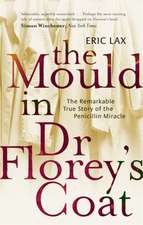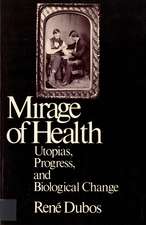Bodily Matters – The Anti–Vaccination Movement in England, 1853–1907: Radical Perspectives
Autor Nadja Durbachen Limba Engleză Paperback – 29 dec 2004
Din seria Radical Perspectives
-
 Preț: 202.19 lei
Preț: 202.19 lei -
 Preț: 193.33 lei
Preț: 193.33 lei -
 Preț: 265.20 lei
Preț: 265.20 lei -
 Preț: 302.74 lei
Preț: 302.74 lei -
 Preț: 308.90 lei
Preț: 308.90 lei -
 Preț: 263.29 lei
Preț: 263.29 lei -
 Preț: 302.36 lei
Preț: 302.36 lei -
 Preț: 303.11 lei
Preț: 303.11 lei - 23%
 Preț: 887.39 lei
Preț: 887.39 lei -
 Preț: 299.29 lei
Preț: 299.29 lei -
 Preț: 306.77 lei
Preț: 306.77 lei -
 Preț: 263.29 lei
Preț: 263.29 lei -
 Preț: 262.70 lei
Preț: 262.70 lei -
 Preț: 229.20 lei
Preț: 229.20 lei -
 Preț: 301.20 lei
Preț: 301.20 lei -
 Preț: 266.18 lei
Preț: 266.18 lei -
 Preț: 262.70 lei
Preț: 262.70 lei -
 Preț: 306.99 lei
Preț: 306.99 lei -
 Preț: 265.20 lei
Preț: 265.20 lei -
 Preț: 302.96 lei
Preț: 302.96 lei -
 Preț: 303.88 lei
Preț: 303.88 lei - 9%
 Preț: 668.08 lei
Preț: 668.08 lei -
 Preț: 253.07 lei
Preț: 253.07 lei
Preț: 215.97 lei
Nou
Puncte Express: 324
Preț estimativ în valută:
41.34€ • 44.62$ • 34.66£
41.34€ • 44.62$ • 34.66£
Carte disponibilă
Livrare economică 29 martie-12 aprilie
Livrare express 15-21 martie pentru 28.33 lei
Preluare comenzi: 021 569.72.76
Specificații
ISBN-13: 9780822334231
ISBN-10: 0822334232
Pagini: 296
Ilustrații: 12 illustrations
Dimensiuni: 168 x 243 x 31 mm
Greutate: 0.42 kg
Ediția:New.
Editura: MD – Duke University Press
Seria Radical Perspectives
Locul publicării:United States
ISBN-10: 0822334232
Pagini: 296
Ilustrații: 12 illustrations
Dimensiuni: 168 x 243 x 31 mm
Greutate: 0.42 kg
Ediția:New.
Editura: MD – Duke University Press
Seria Radical Perspectives
Locul publicării:United States
Recenzii
This fascinating book uses the anti-vaccination movement to illuminate our understanding of the major themes in nineteenth-century British history: the nature of liberalism, class tensions, and resistance to state intervention. Beautifully written, it brings the movement to life.Anna Clark, author of Scandal: The Sexual Politics of the British ConstitutionAll too often the large-scale resistance to compulsory vaccination in England has been treated as a quaint case study in anti-modern or irrational opposition to scientific progress. Nadja Durbach has made a key contribution to modern British history in particular and to the analysis of class culture more generally by rescuing this resistance to state medicine from what E. P. Thompson memorably termed the enormous condescension of posterity.George Behlmer, author of Friends of the Family: The English Home and Its Guardians, 18501940"Timely and absorbing. . . .Susan Pedersen, London Review of Books"Fascinating."Christopher Hamlin, American Historical Review "Fascinating. . . . Durbach writes well, and her book provides . . . abundant opportunity to reflect upon the many ways in which arguments in health care frequently are 'about' a great deal more than initially appears to be the case."Edward E. St. Godard, Canadian Medical Association Journal "A clearly argued and detailed examination. . . . Bodily Matters is an accessible work that should appeal to a broad range of readers."Dan Malleck, History, Reviews of New Books"Bodily Matters gives us a new insight into antivaccination but shows us that much remains to be discovered about this curious Victorian protest movement."Deborah Brunton, Journal of British Studies"Engaging. . . . Durbach convincingly rescues the anti-vaccination movement from the fringes of medical, political, and social history, and demonstrates that anti-vaccinationists should be seen as central players in the construction of Victorianism. . . . A lively narrative."Marjorie Levine-Clark, H-Albion, H-Net ReviewsThis outstandingly vital work is a breakthrough in the historiography of English anti-vaccinationism.Logie Barrow, Medical HistoryNadia Durbachs book is a sympathetic, nuanced, well-researched, and clearly written account of antivaccinationism in its historical context.Peter Baldwin, Bulletin of the History of MedicineBodily Matters makes an important contribution to the contemporary reassessment of many facets of Victorian Culture. Martin Finchman, Victorian StudiesNadja Durbachs Bodily Matters should be welcomed by students of health, gender, and citizenship. Chris Dooley, Left HistoryDurbachs insightful study is the most comprehensive and sophisticated treatment of this profoundly misunderstood English movement. . . . A highly persuasive and ground-breaking analysis of the main ingredients of the Victorian anti-vaccination movement and its impact on Victorian society.Jennifer E. Keelan, Body and SocietyDurbach provides a nuanced understanding of activists words and actions.James Colgrove, Journal of Health Politics, Policy and LawDurbach's account of the anti-vaccination movement is clearly and forcefully written and provides an authoritative survey of Victorian debates about the role of the state in disease prevention. Bodily Matters will engage anyone interested in public health and the history of epidemiology, and post9/11 fears about bioterrorism and the looming threat of a bird flu pandemic may broaden the audience for this text.Solveig C. Robinson, Perspectives in Biology and MedicineClearly written and pointedly illustrated, the book focuses on the key events and strategies of the anti-vaccinationists campaign. . . . Bodily Matters is not, however, simply a contribution to the subdiscipline of medical history. Big themes of general British nineteenth-century history play a significant part in this story, and anti-vaccinationism, as Durbach shows, provides a useful example of the tensions between Old Liberalism and New Liberalism, class relations, gender issues, and resistance to state intervention.Anne Hardy, HistoryDurbach writes about an important and little known footnote in the history of public health in a readable and accessible style. . . . recommend this to anyone with an interest in the history, politics or ethics of public health, and the vexed questions around personal liberty and the collective benefits of medical technology.Christopher C. Potter, Journal of Public HealthDurbach has produced a rich and sympathetic picture of those stigmatised by many Victorians and their successors as mad, bad, dangerous, poor, stupid, or downright bloodyminded. . . . [An] important book. . . .Chris Lawrence, MetascienceBodily Matters provides a detailed and meticulous study of the complexities of the movement. . . . A useful pioneering study of a neglected aspect of Victorian medical politics.Lesley A. Hall, Victorians Institute Journal
"This fascinating book uses the anti-vaccination movement to illuminate our understanding of the major themes in nineteenth-century British history: the nature of liberalism, class tensions, and resistance to state intervention. Beautifully written, it brings the movement to life."--Anna Clark, author of Scandal: The Sexual Politics of the British Constitution "All too often the large-scale resistance to compulsory vaccination in England has been treated as a quaint case study in 'anti-modern' or 'irrational' opposition to scientific progress. Nadja Durbach has made a key contribution to modern British history in particular and to the analysis of class culture more generally by rescuing this resistance to state medicine from what E. P. Thompson memorably termed 'the enormous condescension of posterity.'"--George Behlmer, author of Friends of the Family: The English Home and Its Guardians, 1850-1940 "Timely and absorbing..."--Susan Pedersen, London Review of Books "Fascinating."--Christopher Hamlin, American Historical Review "Fascinating... Durbach writes well, and her book provides ... abundant opportunity to reflect upon the many ways in which arguments in health care frequently are 'about' a great deal more than initially appears to be the case."--Edward E. St. Godard, Canadian Medical Association Journal "A clearly argued and detailed examination... Bodily Matters is an accessible work that should appeal to a broad range of readers."--Dan Malleck, History, Reviews of New Books "Bodily Matters gives us a new insight into antivaccination but shows us that much remains to be discovered about this curious Victorian protest movement."--Deborah Brunton, Journal of British Studies "Engaging... Durbach convincingly rescues the anti-vaccination movement from the fringes of medical, political, and social history, and demonstrates that anti-vaccinationists should be seen as central players in the construction of Victorianism... A lively narrative."--Marjorie Levine-Clark, H-Albion, H-Net Reviews "This outstandingly vital work is a breakthrough in the historiography of English anti-vaccinationism."--Logie Barrow, Medical History "Nadia Durbach's book ... is a sympathetic, nuanced, well-researched, and clearly written account of antivaccinationism in its historical context."--Peter Baldwin, Bulletin of the History of Medicine "Bodily Matters makes an important contribution to the contemporary reassessment of many facets of Victorian Culture." --Martin Finchman, Victorian Studies "Nadja Durbach's Bodily Matters... should be welcomed by students of health, gender, and citizenship." --Chris Dooley, Left History "Durbach's insightful study is the most comprehensive and sophisticated treatment of this profoundly misunderstood English movement... A highly persuasive and ground-breaking analysis of the main ingredients of the Victorian anti-vaccination movement and its impact on Victorian society."--Jennifer E. Keelan, Body and Society "Durbach provides a nuanced understanding of activists' words and actions."--James Colgrove, Journal of Health Politics, Policy and Law "Durbach's account of the anti-vaccination movement is clearly and forcefully written and provides an authoritative survey of Victorian debates about the role of the state in disease prevention. Bodily Matters will engage anyone interested in public health and the history of epidemiology, and post-9/11 fears about bioterrorism and the looming threat of a bird flu pandemic may broaden the audience for this text."--Solveig C. Robinson, Perspectives in Biology and Medicine "Clearly written and pointedly illustrated, the book focuses on the key events and strategies of the anti-vaccinationists' campaign... Bodily Matters is not, however, simply a contribution to the subdiscipline of medical history. Big themes of general British nineteenth-century history play a significant part in this story, and anti-vaccinationism, as Durbach shows, provides a useful example of the tensions between Old Liberalism and New Liberalism, class relations, gender issues, and resistance to state intervention."--Anne Hardy, History "Durbach writes about an important and little known footnote in the history of public health in a readable and accessible style... recommend this to anyone with an interest in the history, politics or ethics of public health, and the vexed questions around personal liberty and the collective benefits of medical technology."--Christopher C. Potter, Journal of Public Health "Durbach has produced a rich and sympathetic picture of those stigmatised by many Victorians and their successors as mad, bad, dangerous, poor, stupid, or downright bloodyminded... [An] important book..."--Chris Lawrence, Metascience "Bodily Matters provides a detailed and meticulous study of the complexities of the movement... A useful pioneering study of a neglected aspect of Victorian medical politics."--Lesley A. Hall, Victorians Institute Journal
"This fascinating book uses the anti-vaccination movement to illuminate our understanding of the major themes in nineteenth-century British history: the nature of liberalism, class tensions, and resistance to state intervention. Beautifully written, it brings the movement to life."--Anna Clark, author of Scandal: The Sexual Politics of the British Constitution "All too often the large-scale resistance to compulsory vaccination in England has been treated as a quaint case study in 'anti-modern' or 'irrational' opposition to scientific progress. Nadja Durbach has made a key contribution to modern British history in particular and to the analysis of class culture more generally by rescuing this resistance to state medicine from what E. P. Thompson memorably termed 'the enormous condescension of posterity.'"--George Behlmer, author of Friends of the Family: The English Home and Its Guardians, 1850-1940 "Timely and absorbing..."--Susan Pedersen, London Review of Books "Fascinating."--Christopher Hamlin, American Historical Review "Fascinating... Durbach writes well, and her book provides ... abundant opportunity to reflect upon the many ways in which arguments in health care frequently are 'about' a great deal more than initially appears to be the case."--Edward E. St. Godard, Canadian Medical Association Journal "A clearly argued and detailed examination... Bodily Matters is an accessible work that should appeal to a broad range of readers."--Dan Malleck, History, Reviews of New Books "Bodily Matters gives us a new insight into antivaccination but shows us that much remains to be discovered about this curious Victorian protest movement."--Deborah Brunton, Journal of British Studies "Engaging... Durbach convincingly rescues the anti-vaccination movement from the fringes of medical, political, and social history, and demonstrates that anti-vaccinationists should be seen as central players in the construction of Victorianism... A lively narrative."--Marjorie Levine-Clark, H-Albion, H-Net Reviews "This outstandingly vital work is a breakthrough in the historiography of English anti-vaccinationism."--Logie Barrow, Medical History "Nadia Durbach's book ... is a sympathetic, nuanced, well-researched, and clearly written account of antivaccinationism in its historical context."--Peter Baldwin, Bulletin of the History of Medicine "Bodily Matters makes an important contribution to the contemporary reassessment of many facets of Victorian Culture." --Martin Finchman, Victorian Studies "Nadja Durbach's Bodily Matters... should be welcomed by students of health, gender, and citizenship." --Chris Dooley, Left History "Durbach's insightful study is the most comprehensive and sophisticated treatment of this profoundly misunderstood English movement... A highly persuasive and ground-breaking analysis of the main ingredients of the Victorian anti-vaccination movement and its impact on Victorian society."--Jennifer E. Keelan, Body and Society "Durbach provides a nuanced understanding of activists' words and actions."--James Colgrove, Journal of Health Politics, Policy and Law "Durbach's account of the anti-vaccination movement is clearly and forcefully written and provides an authoritative survey of Victorian debates about the role of the state in disease prevention. Bodily Matters will engage anyone interested in public health and the history of epidemiology, and post-9/11 fears about bioterrorism and the looming threat of a bird flu pandemic may broaden the audience for this text."--Solveig C. Robinson, Perspectives in Biology and Medicine "Clearly written and pointedly illustrated, the book focuses on the key events and strategies of the anti-vaccinationists' campaign... Bodily Matters is not, however, simply a contribution to the subdiscipline of medical history. Big themes of general British nineteenth-century history play a significant part in this story, and anti-vaccinationism, as Durbach shows, provides a useful example of the tensions between Old Liberalism and New Liberalism, class relations, gender issues, and resistance to state intervention."--Anne Hardy, History "Durbach writes about an important and little known footnote in the history of public health in a readable and accessible style... recommend this to anyone with an interest in the history, politics or ethics of public health, and the vexed questions around personal liberty and the collective benefits of medical technology."--Christopher C. Potter, Journal of Public Health "Durbach has produced a rich and sympathetic picture of those stigmatised by many Victorians and their successors as mad, bad, dangerous, poor, stupid, or downright bloodyminded... [An] important book..."--Chris Lawrence, Metascience "Bodily Matters provides a detailed and meticulous study of the complexities of the movement... A useful pioneering study of a neglected aspect of Victorian medical politics."--Lesley A. Hall, Victorians Institute Journal
Notă biografică
Textul de pe ultima copertă
"All too often the large-scale resistance to compulsory vaccination in England has been treated as a quaint case study in 'anti-modern' or 'irrational' opposition to scientific progress. Nadja Durbach has made a key contribution to modern British history in particular and to the analysis of class culture more generally by rescuing this resistance to state medicine from what E. P. Thompson memorably termed 'the enormous condescension of posterity.'"--George Behlmer, author of "Friends of the Family: The English Home and Its Guardians, 1850-1940"
Descriere
Considers the Victorian anti-vaccination movement in the context of debates over citizenship, parental rights, class politics, the significance of bodily integrity, the control of contagious disease, and state access to the bodies of both adult and infant subjects














